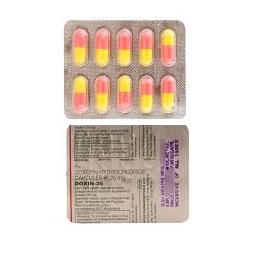Doxepin: A Versatile Medication for Depression, Anxiety, and Sleep Disorders
Doxepin is a tricyclic antidepressant (TCA) that has stood the test of time as a treatment for a variety of conditions, particularly depression, anxiety, and insomnia. First approved by the FDA in the 1960s, it remains a relevant therapeutic option today, especially in cases where newer medications may not be effective or well tolerated.
What Is Doxepin?
Doxepin belongs to the class of TCAs, originally developed to treat major depressive disorder (MDD). Over the years, clinicians found it useful for managing anxiety, chronic hives, and more recently, sleep disorders. At low doses, it is often prescribed specifically for insomnia under the brand name Silenor.
How It Works
Doxepin works by increasing the levels of serotonin and norepinephrine in the brain—two key neurotransmitters involved in mood regulation. It also has potent antihistamine effects, which explains its sedative properties at lower doses. This dual mechanism makes it effective both as a mood stabilizer and as a sleep aid.
Key Uses of Doxepin
-
Depression and Anxiety: At higher doses (75–300 mg), doxepin is used to treat moderate to severe depression and anxiety, especially in patients who haven’t responded well to SSRIs or SNRIs.
-
Insomnia: At low doses (3–6 mg), its antihistaminergic effects help promote better sleep without the grogginess associated with many sleep medications.
-
Chronic Urticaria and Allergies: Off-label, doxepin is sometimes used to manage chronic itching and hives due to its antihistamine action.
Benefits and Advantages
-
Non-habit forming: Unlike benzodiazepines or other sedatives, doxepin is not associated with dependency when used correctly.
-
Dual action: It can treat both mood and sleep disturbances, which often co-occur.
-
FDA-approved for insomnia: Its approval for sleep issues at low doses sets it apart from many antidepressants used off-label for the same purpose.
Potential Side Effects
Common side effects include dry mouth, dizziness, constipation, and drowsiness. Because it can cause sedation, caution is advised when taking it during the day. Like other TCAs, it can also affect cardiac conduction, so ECG monitoring may be recommended for those with heart conditions.
Final Thoughts
Doxepin may not be as widely known as some modern antidepressants. However its versatility, long-standing clinical use, and efficacy make it a valuable option for patients struggling with mood disorders, anxiety, or sleep problems. With the guidance of a healthcare provider, it can be tailored to meet individual therapeutic needs. Especially when first-line treatments fall short.
